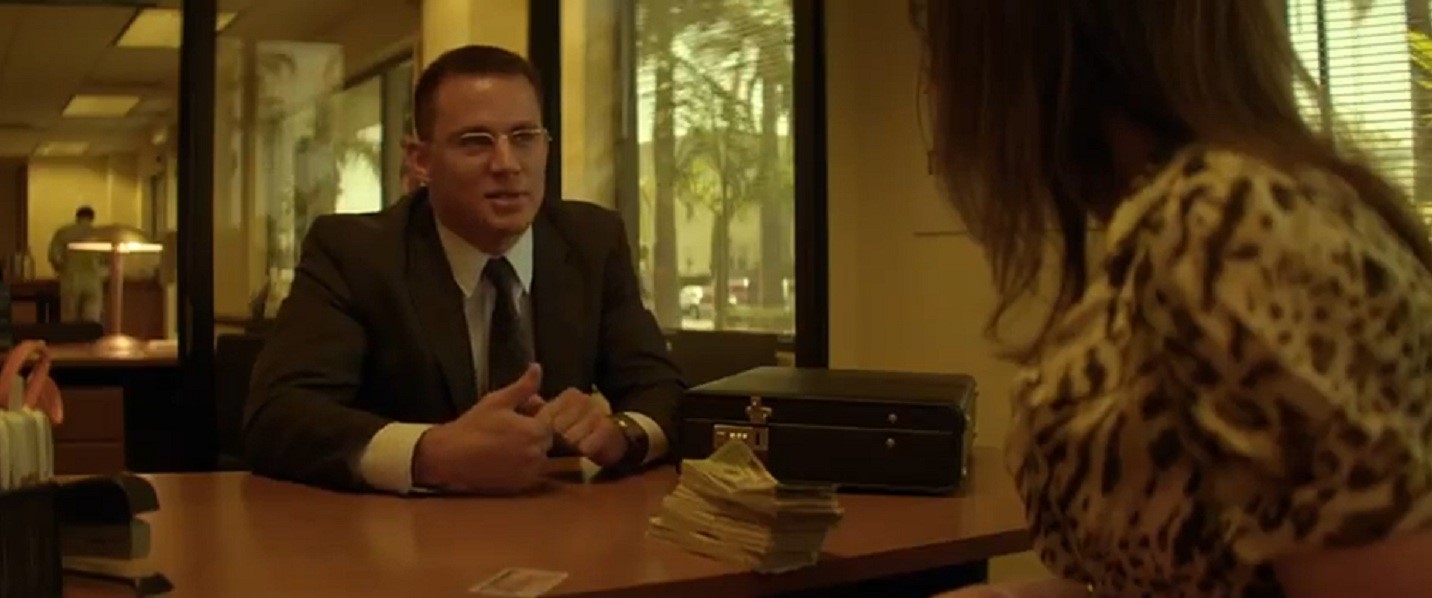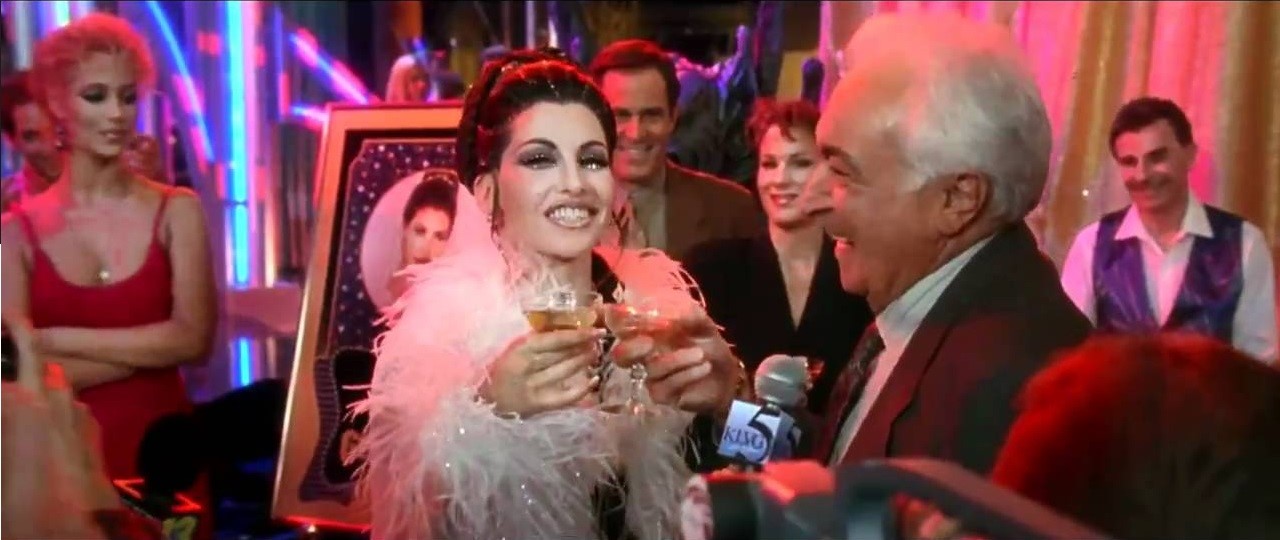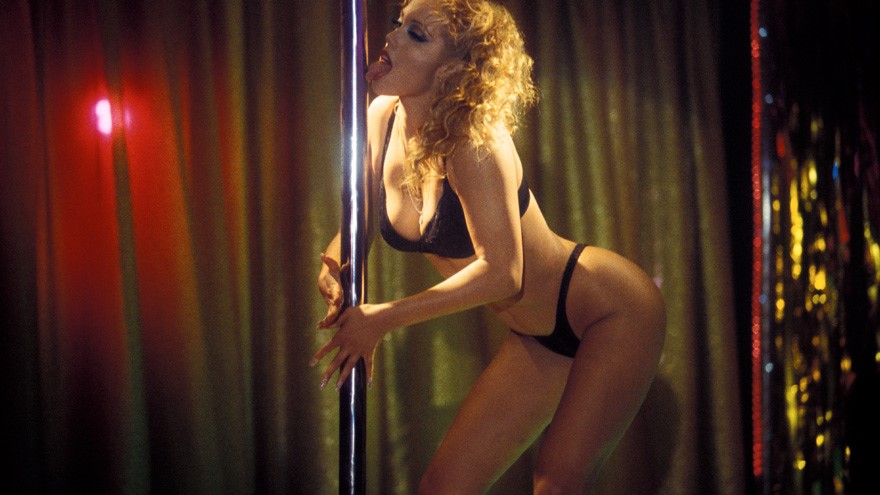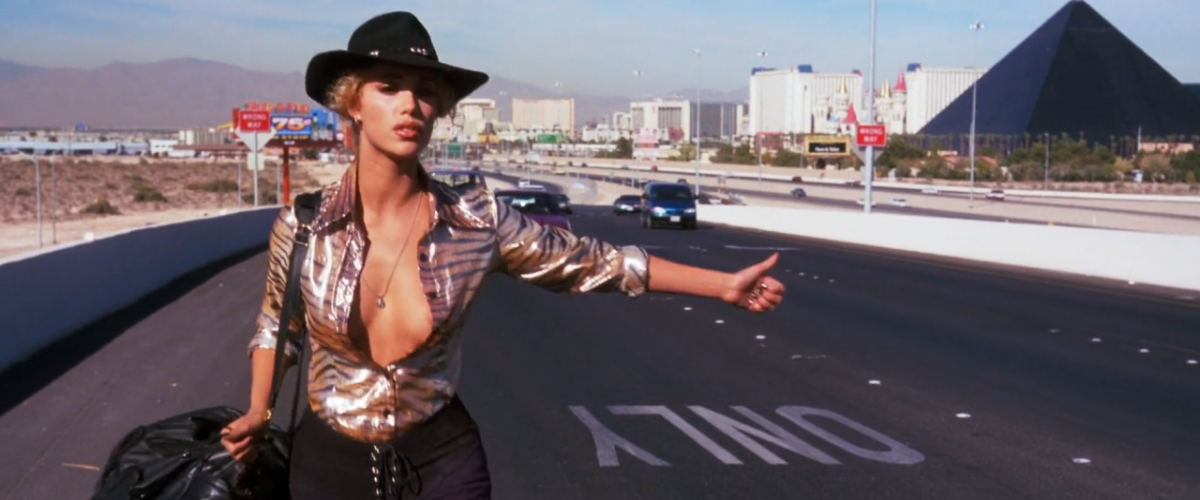 Nora E. Derrington holds degrees from Boston University and the University of New Mexico. She currently teaches English, and does a lot of thinking and talking about popular culture, at Washburn University in Topeka, Kansas. Her stories and essays have appeared in North Dakota Quarterly, The Future Fire, the anthology Poems for the Queer Revolution, and elsewhere, and she reviews fantasy, horror, romance, and science fiction titles for Publishers Weekly. “You don’t think of them as human”: Strippers in (Somewhat) Recent Film As has been noted elsewhere on Whores of Yore (e.g. http://www.thewhoresofyore.com/history-of-burlesque.html), stripping—in various forms—has been around for centuries. Understandably, then, strippers and strip clubs have been featured in film in a variety of ways, from featured roles to bit parts, almost since the medium was formed. Unfortunately, while there are certainly exceptions, depictions of strippers and strip clubs in film often serve primarily negative purposes: they might establish the seediness of a town, perhaps, or the depths to which a character has sunk or from which they’ll need to rise. Strippers are treated as disposable in films like 1998’s Very Bad Things, in which a stripper is accidentally killed at a bachelor party, and—based on the film’s trailers—in the forthcoming Rough Night, in which a stripper is accidentally killed at a bachelorette party. Like all too many depictions of sex workers in popular culture, those depictions serve more often than not to reinforce the status quo that sex workers are pitiable at best, and often simply less than human. For example, look at the 2012 Magic Mike, which was marketed as an effervescent romp through the world of male strippers. Magic Mike can be viewed through two different lenses: that of the story the film appears to be trying to tell, and that of the jumbled message that is the end result. A charitable reading of the film is that it’s meant to be a coming of age story. Mike is a 30-year-old man who pursues a number of interests, but has yet to commit to a proper career. Similarly, he sleeps with a procession of nameless and faceless women, the exception being his regular booty call Joanna, but shows no interest in settling down with or even really dating any of those women. He is, the film would have us believe, an overgrown adolescent, as are his cohorts in the male revue he stars in. Mike’s choice to leave the revue as it transitions from Tampa to Miami and to begin a romantic relationship with his friend’s sister, Brooke, is therefore portrayed as a welcome transition into true adulthood. However, the way the film introduces Mike to the audience belies the role the he would need to play in order for the above version of the story to make sense. Before we see him as a stripper, we see him as a roofer, interacting with the foreman of a building job in a professional way, negotiating for better pay and bemoaning the presence of men who are clearly unprepared for the job they've signed on to do. We learn early on that his ultimate goal is to design and build unique furniture, and that all his other “entrepreneurial” work—the roofing, the stripping, and a third business in auto detail—is a means to that end. “I am not my job,” Mike declares near the end of the film—meaning, of course, that he's more than just a stripper. The film has ably illustrated that notion, showing that he’s willing to work hard at his various crafts, to put in the necessary time and effort to succeed. He’s saved $13,000 toward a down payment for a business loan to begin his furniture business in earnest. The film blocks Mike’s path, though, for reasons that seem relatively arbitrary. This could be viewed as merely a storytelling problem: at the beginning of the film, Mike is not interested in settling down into a romantic relationship, but he's clearly got the rest of his life together, so the conflict must come from without rather than within. The bank won’t give Mike that business loan because his credit score is in the 400s, allegedly because his various businesses deal primarily in cash. (Not only does that rationale for his credit score ring hollow, but the way the scene is presented, it seems like the woman at the bank might be willing to try a little harder to figure out a way to turn this nice young man, to whom she is clearly attracted and who has brought in not just the $13,000 cash but also an illustrated business plan, into a customer.) After that, Mike’s life begins to crumble. Joanna, it turns out, is six weeks away from becoming a licensed psychologist and has a fiancé on the side: her time with Mike has been a fun diversion, it would seem, but it’s time for her to move on, to become a proper adult. Adam, the young man Mike rescued and brought into the revue after Adam was fired from the construction job, has, in the span of a month, begun not just using but also dealing drugs. Dallas, the manager of the revue, takes an abrupt turn from benign friend to overt antagonist, scorning Mike’s participation in the revue and all but daring him to leave. The last straw is when Adam loses the drugs he's meant to sell and ends up $10,000 in debt to a dealer, who sends heavies to bust up Mike’s house (including, of course, his prized coffee table, the one he built himself), for flimsy reasons beyond it simply being what the script said to do. So, naturally, because Mike is a man of his word and had told Brooke that he’d protect Adam, Mike sacrifices his business down payment to pay off the drug dealer. The scene of the dealer’s thugs trashing Mike’s house gives the viewer a very clear image: the lifestyle that comes with stripping is interfering with Mike’s progress toward his dream of building furniture for a living. He goes into the club one last time, but leaves before the show gets underway. He turns his back on stripping and heads over to Brooke’s apartment, ready to begin his new life of monogamy and... ...and what, exactly? Just roofing and auto detailing, then? Unless one posits that stripping is inherently morally inferior, and it’s better to progress more slowly toward a lifelong goal through “honest work” (as defined by whom?) than to keep doing a job that you enjoy and that is not only not hurting anyone but is actively bringing others joy, then Mike’s choice doesn’t make much sense. Unless, of course, the film is indeed setting up stripping as a morally inferior choice. The trouble is, the film can’t seem to decide which way it wants to have it. Mike is presented as a well-rounded character—again, dedicated and hardworking, kind and loyal, maybe a little fucked up in the romance department. The revue is harmless, sexy fun, and Mike is an exceptional dancer. Dancing is a job that tends to come with a relatively brief lifespan, so why shouldn't Mike enjoy the attention while he can? the first half of the film seems to be asking.  Mike and his muscles Mike and his muscles Because of the lifestyle! the second half of the film appears to answer. It then falls back on the same tired old tropes: sex work leads to drug use! People in the sex industry are emotionally stunted, self-centered assholes! If a good person like Mike is involved in that lifestyle, they’d better get out before it’s too late! Again, then, what we end up with is a jumble of ideas that don’t quite fit together: Mike is a well-rounded character for whom stripping is only one facet, making money hand over fist and setting it aside toward a larger goal—but also the stripping lifestyle is immoral and dangerous and wouldn’t it be better if you just settled down with a nice young lady and got a normal job? Magic Mike puts in a strong effort toward humanizing strippers, presenting stripping as simply a job, a means to an end, but it ends up abandoning that effort and settling for the status quo. Another film in which the treatment of strippers and other sex workers is problematic at best is 1995’s Showgirls. Showgirls might seem much less worthy of consideration than Magic Mike, given its age and, perhaps more importantly, its status in cinematic history as an epic flop: it made approximately $20 million (not quite half its estimated budget) in theaters (IMDb, n.d. b) while Magic Mike made over $100 million (IMDb, n.d. a), and Showgirls has a Rotten Tomatoes rating of 19% fresh (RottenTomatoes.com, n.d. b), compared to Magic Mike’s 81% (RottenTomatoes.com, n.d. a). However, critics and scholars have been reevaluating Showgirls in the twenty-first century, in venues ranging from a scholarly round-table discussion in Film Quarterly in 2003 to critic Adam Nayman’s 2014 book It Doesn’t Suck: Showgirls. If we’re going to take Showgirls seriously—even if taking it seriously means recognizing it as camp or satire—it’s worth examining what it has to say not just about exotic dancing as an industry, but about the dancers themselves. Like Magic Mike, though, it’s not entirely clear what, exactly, Showgirls is trying to say about what it means to trade sexual labor, mostly in the form of topless dancing, for money, or for a leg up, or to try to realize a dream. Early on, Nomi Malone is established as a young woman with a single-minded focus on one goal: to become a dancer. Though she smacks the man who drives her from Salt Lake City to Las Vegas for suggesting she’ll be “one of those private escort dancers,” just a few weeks after she arrives in Las Vegas she’s taken with the performance of the Stardust’s topless show Goddess. The swelling music and her immediate understanding of the show’s choreography show demonstrate this is her dream, solidified—this is the dancing she wants to do. By contrast, the dancing Nomi is currently doing is at a dive called Cheetah’s Topless Club. The star of Goddess, Cristal Connors, scoffs that what Nomi does at Cheetah’s isn’t dancing, and Nomi’s angst following that comment indicates her agreement. In certain scenes, Nomi clearly finds the work she does at Cheetah’s humiliating and degrading. In others, though, she seems to thoroughly enjoy the attention it brings her, and it’s difficult for the viewer to discern whether that’s a characterological conflict within Nomi, or an issue with Elizabeth Berkeley’s acting, or a problem with the script or direction, or all of the above. At any rate, though, the transactional nature of the work at Cheetah’s is clear: the women who work there trade sex (or simulated sex—“you fuck ‘em without fuckin’ ‘em,” Nomi’s would-be dance teacher James declares) for money. In roughly the first half of the film, the implication seems to be that this is sordid, exploitative, and shameful. Indeed, writer Joe Eszterhas was adamant in 1995 that the film “shows that dancers in Vegas are often victimized, humiliated, used, verbally and physically raped by the men who are at the power centers of that world” (qtd. in Dowd, 1995). The idea that this is a film meant to draw attention to dancers’ plights, though, is complicated by the film’s second half, when Nomi secures a job in Goddess’s chorus line. The backstage environment is nothing like it was at Cheetah’s: the women fight with, swear at, and threaten one another, rather than looking out for one another the way they did at Cheetah’s. Indeed, two figures from Cheetah’s come to see Nomi dance in Goddess, Al the manager and burlesque throwback Mama Bazoom, in a scene that’s played the way a visit from skeptical but loving parents would be in any other rising-star film. So, Cheetah’s is seedy and exploitative—indeed, Al isn’t subtle about demanding sexual favors from the dancers—but it’s also something like home, at least compared to the Stardust. As critical as James was about Cheetah’s, he changes his tune when Nomi auditions for Goddess, saying that at least the work she does at Cheetah’s is “honest.” In the second half of the film, it seems as if the film’s message is that everyone degrades themselves in order to get by. What garbled idealism Nomi had disappears once she sees what she can get away with at the Stardust, culminating in her pushing Cristal down the stairs so she’ll be cast in Goddess’s lead role. At the end of the film, Cristal reveals from her hospital bed that she’d gotten her first lead role in a similar way. James reveals that he’s going to marry another dancer, one he doesn’t exactly love, because she’s pregnant and her parents own a grocery store where he can work and they can get discounted baby food. Indeed, the only character who doesn’t seem to have traded at least a part of her soul to get what she wants is Nomi’s roommate and best friend, Molly, a hard-working seamstress who’s also pursuing a degree of some sort. She warns Nomi not to get “sucked into” the world of Goddess. Naturally, then, morally grounded Molly is the one who ends up suffering the most in this system, finally getting to meet her idol, singer Andrew Carver, through Nomi’s connections, only to have him brutally beat and rape her. The message of the second half of the film seems to center on capitalism as a corrupting force, in the entertainment industry in particular: “You are a whore, darlin’,” Cristal tells Nomi. “We all are.” The trouble is, for all that the film might want to draw the viewer’s attention to the way the industry or the American economic system treats people, the film itself is still treating them as disposable, easily forgotten. If Showgirls is a film “about a young woman who refuses to sell her soul, who refuses to sell out against the forces of corruption” (Eszterhas, qtd. in Dowd, 1995), what should the viewer make of the broken bodies Nomi leaves behind? Cristal has made her choices and has gotten a hefty settlement from the Stardust, so presumably we shouldn’t be concerned about her extensive injuries. But what about Molly? Is it really supposed to be enough that Nomi kicked the shit out of Andrew Carver in revenge for Molly’s abuse? Is the fact that Nomi is ostensibly taking the moral high ground at the end of the film by hitchhiking back out of town going to pay Molly’s hospital bills? It seems that if we’re supposed to think of the people Nomi leaves behind at all, we’re supposed to think of them with pity—clearly they weren’t as strong or savvy as Nomi is, or else they’d have gotten out, too. Presumably we’re meant to see what a corrupting influence the sex and/or entertainment industries are (which makes it particularly interesting that Nomi is heading toward Los Angeles as the film closes), while somehow disregarding the humanity of the people involved. Like Magic Mike, then, Showgirls seems to take steps toward humanizing strippers, but ultimately abandons the effort in favor of melodrama. Again, this is just a sampling of the various representations of strippers in film, and not all representations out there are negative. Still, given the work strippers have been doing to have their labor recognized as such (e.g. Covert, 2015), it’s essential that we examine these media representations, and push back when they seem merely to reinforce the status quo—if not suggest worse things about strippers and how they deserve to be treated. References
Covert, B. (2015). Strip Clubs Get Away With Exploiting Dancers Every Day, But These Strippers Are Fighting Back. [online] ThinkProgress. Available at: https://thinkprogress.org/strip-clubs-get-away-with-exploiting-dancers-every-day-but-these-strippers-are-fighting-back-fb3a204bcc5a. [Accessed 16 May 2017]. Dowd, M. (1995). Here’s A Revealing Tale Behind New Film ‘Showgirls’: Attractive Bottom Line Most Important to Hollywood. [online] N.Y. Times News Service. Available at: http://articles.chicagotribune.com/1995-09-21/news/9509210064_1_fake-lap-dancing-prostitution [Accessed 16 May 2017]. IMDb. (no date a). Magic Mike (2012) – Box office / business. [online] Available at: http://www.imdb.com/title/tt1915581/business?ref_=tt_dt_bus [Accessed 16 May 2017]. IMDb. (no date b). Showgirls (1995) – Box office / business. [online] Available at: http://www.imdb.com/title/tt0114436/business?ref_=tt_dt_bus [Accessed 16 May 2017]. RottenTomatoes.com. (no date a). Magic Mike. [online] Available at: https://www.rottentomatoes.com/m/magic_mike [Accessed 16 May 2017]. RottenTomatoes.com. (no date b). Showgirls. [online] Available at: https://www.rottentomatoes.com/m/showgirls [Accessed 16 May 2017].
1 Comment
|
Sex
|





 RSS Feed
RSS Feed